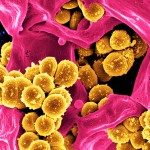Lien vers Pubmed [PMID] – 29869838
2018 Dec;70(12):1994-2002
OBJECTIVE: Secukinumab (anti-interleukin-17A [anti-IL-17A]) is an effective therapy for ankylosing spondylitis and psoriatic arthritis, the prototypical forms of spondyloarthritis (SpA). We undertook this study to determine whether secukinumab modulates the immunopathology of target lesions without blunting systemic immune responses, using peripheral SpA as a model.
METHODS: Twenty patients with active peripheral SpA were included in a 12-week open-label trial with secukinumab (300 mg once weekly from baseline to week 4 and then every 4 weeks thereafter). Outcomes included clinical response, cytokine production by peripheral blood cells using TruCulture technology, and histologic and real-time quantitative polymerase chain reaction analysis of synovial biopsy samples before and after treatment.
RESULTS: All patients completed the 12-week study without severe adverse events (AEs) or severe treatment-related AEs. The efficacy end point, the number of patients meeting the American College of Rheumatology 20% improvement criteria (achieving an ACR20 response) at 12 weeks, was achieved by 13 of the 20 patients, of whom 8 achieved an ACR50 response and 5 achieved an ACR70 response, with rapid and significant improvements in all clinical disease activity measures. Clinical improvement in joint counts was associated with a histologic decrease in synovial sublining macrophages (P = 0.028) and neutrophils (P = 0.004), both of which are sensitive synovial biomarkers of inflammatory response in peripheral SpA, as well as with decreased synovial expression of IL-17A messenger RNA (mRNA) (P = 0.010) but not of tumor necrosis factor mRNA. Systemically, secukinumab treatment decreased the C-reactive protein level and the erythrocyte sedimentation rate (both P < 0.01), and also decreased matrix metalloproteinase 3 production in the TruCulture system (P < 0.05). However, with the exception of IL-17A itself, the capacity of peripheral blood cells to produce a broad panel of cytokines and chemokines upon stimulation with microbial antigens was not affected.
CONCLUSION: This mechanism-of-action study in peripheral SpA indicates that clinical improvement with secukinumab treatment is paralleled by immunomodulation of inflamed target tissues without compromising systemic immune responses.

